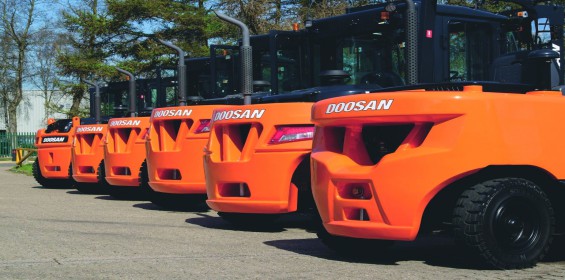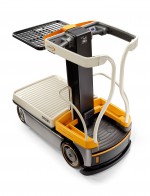Five key pointers on short-term forklift rental
Published: 21 February, 2020
Businesses are under increasing pressure to respond flexibly and efficiently. But how can materials handling operations provide the agility needed, with minimum exposure to risk? Alan Clark, asset manager at Doosan Industrial Vehicle UK, provides a five-point guide to flexing your assets.
In business, nothing is certain. Most companies face a whole raft of on-going commercial challenges from unpredictable spikes in demand and changing markets, to conversely, shortened contract periods and sudden shifts in business strategy.
Such uncertainty makes it difficult to commit to long-term contracts on materials handling equipment. So how can businesses provide the agility needed to respond to changing operational requirements, with minimum exposure to risk? Flexibility to hire and de-hire at short notice allows for greater responsiveness when it’s needed and can offer additional support to an existing fleet – without the prospect of being burdened with unnecessary costs stretching into the future, or a punitive cancellation fee.
Used strategically, short-term rental can supplement the handling capacity of the forklift fleet and add the flexibility needed to cope with surges in demand or a sudden change in direction. But to achieve the best results it’s necessary to understand the dynamics of your own business as much as possible, to identify opportunities for creating flexibility and to plan in how short-term rental can work to your advantage. Here are five key pointers to help you de-risk your operation:
1. Where can short-term rental help? There can be many reasons why a business should want to source a forklift truck on a short-term rental basis as opposed to going for a longer-term contract typically fixed over five years with penalties for early termination.
Unexpected events may occur, such as a breakdown in the fleet, a sudden peak in demand, or a change in product profile. But often, it’s less of a surprise. It may be a planned special promotion, such as Black Friday, or the busy run up to Christmas, where extra capacity in the fleet is needed for a week or two, or perhaps for several months. Then there are situations where a particularly heavy load needs to be lifted, from time-to-time, and it is beyond the load capacity of your on-site trucks. Hiring in a heavy-lifter for occasional use may be the most cost effective solution.
In addition, there may be circumstances where you are just uncertain about future needs, whether that’s the number or type of trucks needed or for how long they will be required. It may be that a new contract looks promising but who knows? Short-term rental could be the safest option, and after six months the situation may become a little clearer.
Of course, you may just need an extra truck or two to boost supply chain performance for a short period, just to clear a backlog or to respond to a specific customer order. Either way, enhanced service performance does wonders for customer loyalty and a short-term rental truck deployed at the right time could help secure future business.
2. Create flexibility. Looking ahead at planned events is an important step to using short-term rental to strategic advantage. Having a clear understanding of up-coming special promotions and peak periods allows you to book your requirements in advance to secure the necessary truck models with the most appropriate fuel type and lifting capacity. The good thing about short-term rental is that if circumstances change and fewer trucks are required, then they can be de-hired at short notice at minimum cost.
Of course, analysis of truck usage over time should give you an indication as to whether or not you need to expand the fleet on a longer contract basis, but a well-considered deployment of short-term rental vehicles should give you the flexibility to ensure performance and responsiveness throughout the year – off-setting risk and uncertainty.
It’s worth remembering that short-term rental may be more costly than longer-term contract hire over twelve months, but the long-term costs of committing to a lengthy contract purchase arrangement, when the future is uncertain, could prove to be a far greater expense. It really depends on how flexible you need to be, and for how long.
Smaller businesses in particular may benefit from the flexibility short-term rental brings, as they are often more susceptible to fluctuations in demand and exposure to risk.
3. What type of truck? Matching the truck model, capacity and fuel type to the application is critical and should be discussed with an expert. Having the correct lifting capacity has important safety implications, but there are performance issues to consider too. Having the correct rating of truck is of course critical, however, in addition to the weight of the goods being lifted, it’s essential to consider their dimensions and the height to which they are to be lifted. Standard fork tines are a metre long, but depending on the load’s dimensions and weight you may need 1200mm or 1800mm long tines to provide the correct load-centre.
The majority of trucks supplied to the market for short-term rental are 2.0 to 3.0 tonnes capacity, although at Doosan we offer an extensive range of counterbalance trucks from 1.5 tonnes right up to 25 tonnes – a far broader range than most suppliers. Although the majority of trucks hired on a short-term rental contract tend to be diesel, both gas and electric models are popular too, with electric trucks used widely in the food sector.
4. Safety, reliability and performance. Importantly, with a short-term rental contract the responsibility for ensuring the safety of the vehicle is on the rental company. That’s not the case with a long-term contract or leasing arrangement. So when selecting a short-term rental supplier it is important to look for a reputable company with a well-maintained, safe and reliable fleet.
Having confidence in a supplier’s ability to provide the right model of truck quickly – within 24 hours and with open de-hire arrangements – gives the responsiveness and flexibility needed for an agile operation.
Fleet size and network coverage are important too. Within the last twelve months Doosan has invested over £1m in its short-term rental fleet and by 2022 its will have over 550 trucks available across its national network of six depots. And giving reassurance on reliability, 47% of Doosan’s fleet is less than three years old.
5. Be confident. Then there is the strength of the maker’s brand to consider. Having a robust, well-engineered truck on site, from a world-leading manufacturer, gives confidence in a trucks ability to perform under the toughest conditions. Doosan Industrial Vehicles is one of the world’s leading manufacturers of forklift trucks. As an important part of the $21 billion global Doosan Group – a conglomerate with a 120-year history – the forklift truck division has the extensive resources necessary to dedicate to product design, performance, ergonomics, energy and importantly, safety.
Short-term forklift truck rental offers a business the flexibility to respond to the many varied and unexpected challenges that hamper supply chain performance.






 CROWN showcased Advanced Material Handling Technologies on Stand 10J61 at IMHX 2016.
CROWN showcased Advanced Material Handling Technologies on Stand 10J61 at IMHX 2016.
